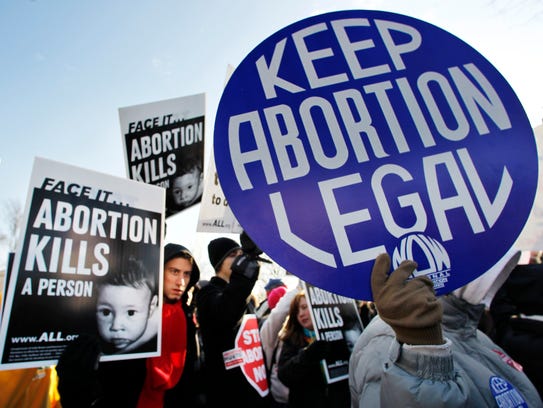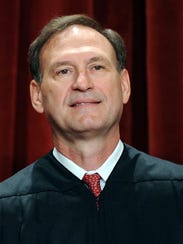Luke Skywalker
Super Moderator
{vb:raw ozzmodz_postquote}:
The Supreme Court may be shifting on issues of religious liberty.(Photo: Jacquelyn Martin, AP)
WASHINGTON — The Supreme Court's defense of religious freedom may be on the decline.
Still reeling from the death<span style="color: Red;">*</span>of its most devout<span style="color: Red;">*</span>justice, Antonin Scalia, the high court has put preventing discrimination above protecting religion in a series of cases over the past year, from same-sex marriage to abortion and contraception.
It took an obscure order<span style="color: Red;">*</span>issued on the last day of the recent term for Justice Samuel Alito to drive home the point. By refusing to consider a family-owned pharmacy's objection to a Washington state regulation forcing it to stock and sell emergency contraceptives, he warned, the court was sending an "ominous sign."
USA TODAY
Supreme Court refuses to hear another case on contraceptives
"If this is a sign of how religious liberty claims will be treated in the years ahead, those who value religious freedom have cause for great concern." Alito said.
Indeed, to<span style="color: Red;">*</span>some groups that work at the intersection of law and religion, the court appears to be taking a left turn on issues where it has steered right in the past —<span style="color: Red;">*</span>a trend that, if it continues, could affect an upcoming case<span style="color: Red;">*</span>involving a Missouri church's effort to qualify for state playground funds and potentially another challenge to the pharmacy rule.
Under Chief Justices William Rehnquist and John Roberts, the court generally has carved out protections for religious groups and individuals. In recent years, it ruled that a<span style="color: Red;">*</span>Missouri church could<span style="color: Red;">*</span>sidestep employment discrimination laws, private corporations<span style="color: Red;">*</span>could avoid federal health regulations regarding contraceptives, and a New York town could open meetings with Christian prayers.
Last year, it ruled in favor of<span style="color: Red;">*</span>a Muslim prisoner who sought to wear a beard, a Muslim woman denied a job<span style="color: Red;">*</span>because she wore a headscarf,<span style="color: Red;">*</span>and a tiny Arizona church that protested municipal restrictions on street signs.
But after ruling for the craft giant Hobby Lobby in the 2014 contraceptives case, the court did not side with religious non-profits or the government this year in similar cases, instead sending them back for further appellate review. It struck down Texas restrictions on abortion clinics and, on the final day of the term, refused to hear the pharmacy's petition.
The Supreme Court's rulings on abortion and contraception worry religious conservatives.<span style="color: Red;">*</span>(Photo: Manuel Balce Ceneta, AP)
[h=2]Seeing 'red flags'[/h]That case was brought by<span style="color: Red;">*</span>the Stormans family, which operates Ralph's Thriftway in Olympia, Wash. The family had what conservatives considered a slam-dunk case against a unusual<span style="color: Red;">*</span>state<span style="color: Red;">*</span>regulation that pharmacies must fill prescriptions for contraceptives, including morning-after pills that prevent a fertilized egg from reaching the uterus.
"Ralph’s has made a strong case ... that the regulations here are improperly designed to stamp out religious objectors," Alito wrote in his dissent, joined by Roberts and Justice Clarence Thomas. In his final footnote, Alito invited another legal challenge.
?Kristen Waggoner, who represented the pharmacy through a federal district court victory and an appeals court defeat, says it's too soon to assume<span style="color: Red;">*</span>the court has shifted on religious freedom cases. But she says<span style="color: Red;">*</span>the refusal to hear the Stormans case "does cause you to wonder."
"We're seeing the red flags," Waggoner says.<span style="color: Red;">*</span>“The risk is Americans will no longer have the right to live consistent with their faith without punishment from the government.”
Some defenders of religious freedom don't share Alito's fear for the future.
Associate Justice Samuel Alito has sounded a conservative alarm over religious liberty cases.<span style="color: Red;">*</span>(Photo: TIM SLOAN, AFP/Getty Images)
"The court has been responsive to religious liberty<span style="color: Red;">*</span>claims in most of the cases in recent years," Eric Rassbach, deputy general counsel at the Becket Fund for Religious Liberty, says.<span style="color: Red;">*</span>“I don’t see a reason to think that the court is going to become deaf to religious claims.”
Douglas Laycock, a religious liberty<span style="color: Red;">*</span>expert at the University of Virginia School of Law, says the risk arises when<span style="color: Red;">*</span>core issues important to liberals are at stake, such as women's access to all methods of birth control.
"The liberal justices are willing to protect religious liberty when their more favored issues are not at stake, or perhaps when the case is clear enough," Laycock says.
[h=2]Advancing equality[/h]But when other interests<span style="color: Red;">*</span>such as preventing discrimination against women, gays and lesbians, or minorities are involved,<span style="color: Red;">*</span>the court's latest responses please liberal groups.
"Religious liberty<span style="color: Red;">*</span>doesn’t give you a right to impose your views on others," Louise Melling, deputy legal director at<span style="color: Red;">*</span>the American Civil Liberties Union, says. She sees the court's recent actions as<span style="color: Red;">*</span>"part of a broader move to advance equality."
Many conservatives<span style="color: Red;">*</span>are wary that the court — stripped of Scalia's influence and vote, and often controlled by the more mercurial Justice Anthony Kennedy — increasingly may favor government regulators over religious believers.
"What we’re seeing is a sort of shift around social norms” concerning sexuality, says Jay Richards, assistant research professor at The Catholic University of America in Washington, D.C. <span style="color: Red;">*</span>“Kennedy is the best Geiger counter. He’s a very good instrument for measuring that.”
The next test will come in the fall,<span style="color: Red;">*</span>when the justices consider a<span style="color: Red;">*</span>Missouri church's challenge to being denied state funds for playground resurfacing. A second case involving the pharmacy regulations also could be headed their way in the future, along with lawsuits from merchants who refuse to participate in same-sex weddings.
"There's more and more of these cases coming up," Waggoner says. "This is not over."
Powered By WizardRSS.com | Full Text RSS Feed
